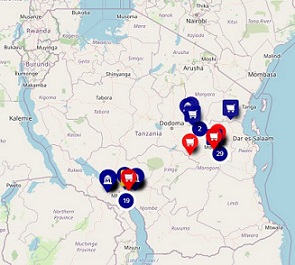In Africa smallholder farmers face numerous risks in their production systems. To learn on risks and develop some risk coping and management strategies, MVIWATA joined a partnership of national and regional farmers’ organisations, European universities and research institutions to create a Farm Risk Management for Africa Project, abbreviated as FARMAF, with the financial support of European Union (EU).
The partners are AGRINATURA-EEIG who comprise of natural Resources institute of University of Greenwich, CIRAD of France and Wageningen University; MVIWATA, The Eastern African Farmers Federation (EAFF), Southern African Confederation of Farmers Unions (SACAU), ROPPA, PROPAC, Zambian National Farmers Union (ZNFU) and Confederation du Paysans Fasso (CPF).
The four year project started in 2012 and will end in December 2015. The project is implemented in three African countries, namely: Burkina Faso, Zambia and Tanzania.
The overall goal of the project is to improve food security and livelihoods of the rural poor in Africa, in particular smallholder farmers in the target African countries, namely Burkina Faso, Tanzania and Zambia.
The specific objective is to enhance access to and use of effective farm risk management tools by smallholder farmers in the target countries. It is expected that this will reduce the exposure of smallholder farmers to downward shocks, improve access to credit and capacity to invest in yield-enhancing technology as well as strengthen their capacity to better manage the marketing of agricultural produce.






